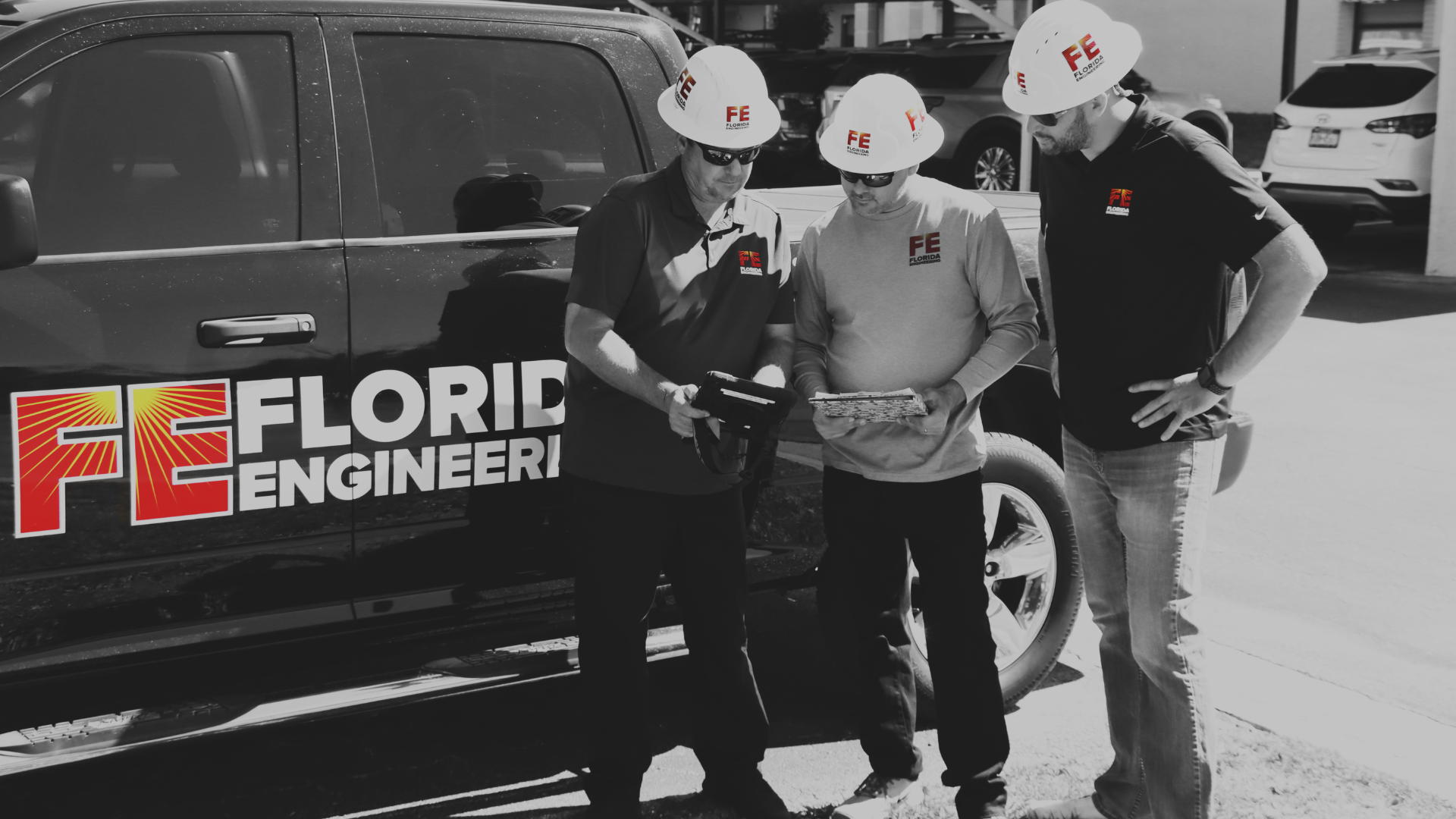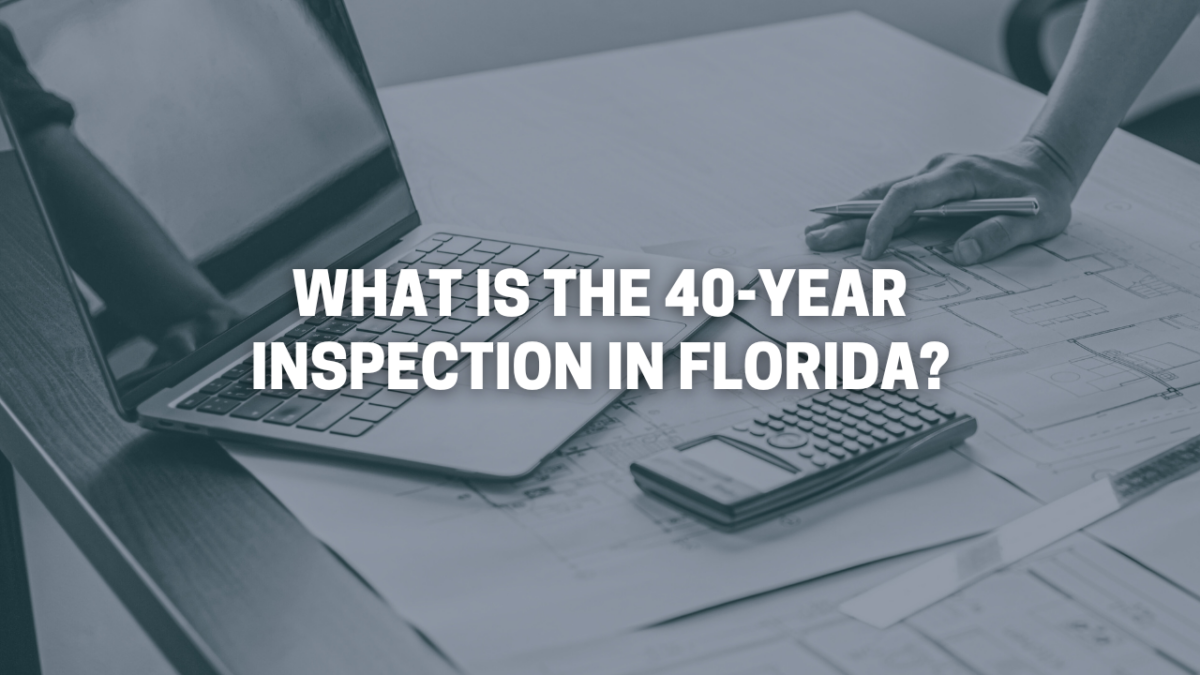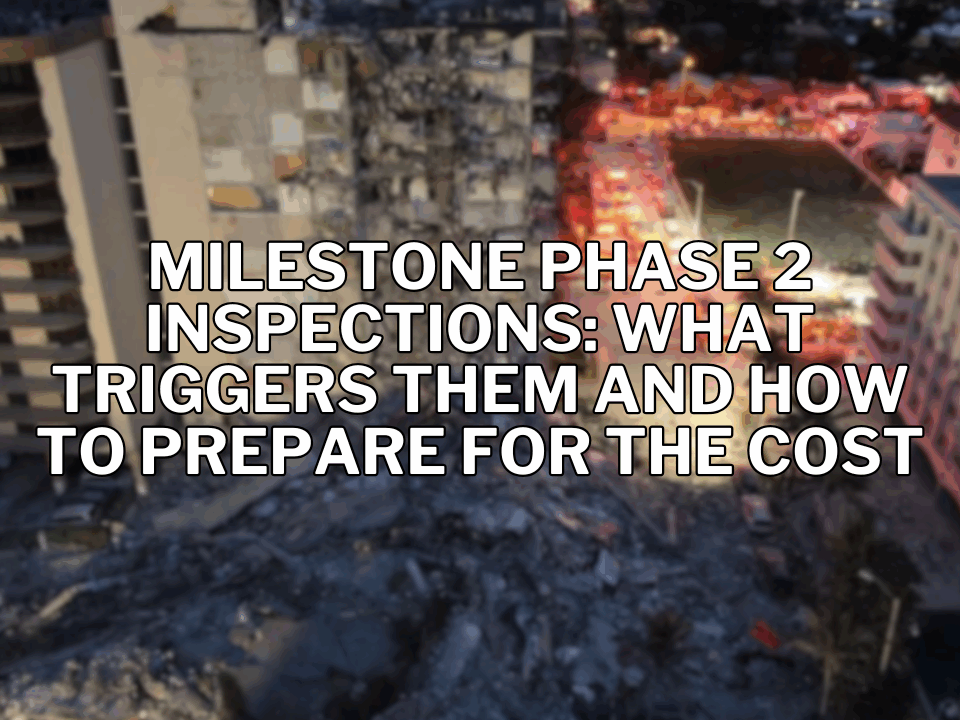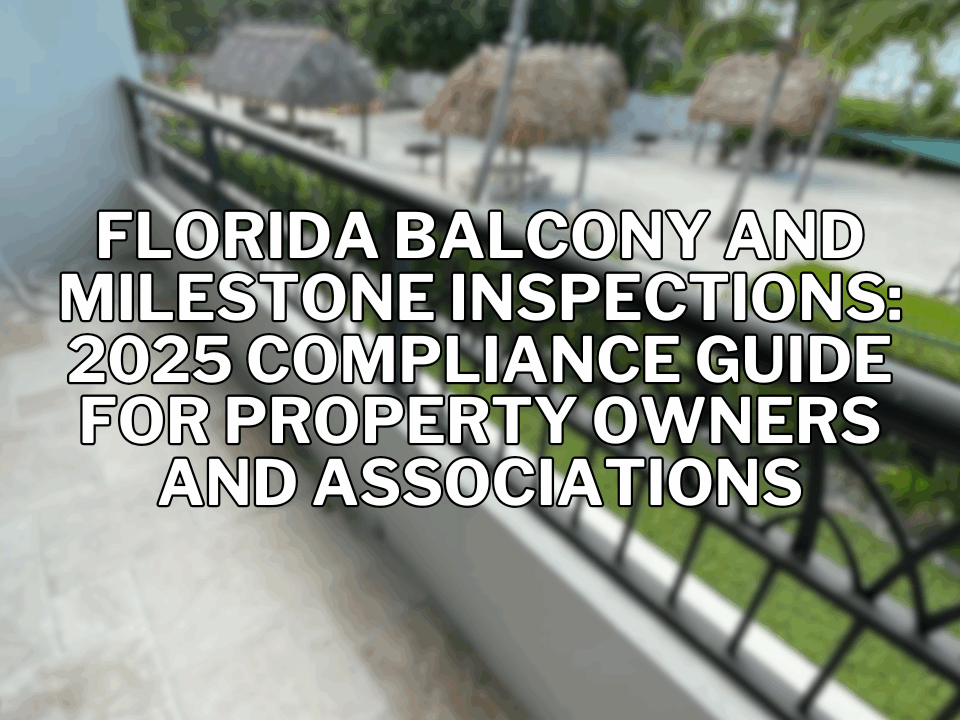
The mere mention of the 40-year Florida building inspection often stirs a mix of curiosity and concern among building owners and property managers. It’s a term used in real estate and construction industries, hinting at a significant regulatory requirement.
But what is the 40-year inspection in Florida, exactly? It’s an essential part of owning or managing a property along the beautiful Florida coastline in order to maintain safety. This particular milestone inspection assesses a building’s structural integrity, electrical compliance, and more.
The uncertainty surrounding the 40-year inspection can feel overwhelming, but you can trust Florida Engineering as your guiding partner. We’re committed to demystifying this crucial inspection and equipping you with the knowledge and confidence to prepare effectively!
What is the 40-Year Inspection in Florida?
So, what is the 40-year inspection in Florida exactly? this vital safety regulation was instituted in 1974 following the collapse of the Federal Office Building in Miami. This tragedy underscored the need for periodic checks on the structural integrity and safety of aging buildings.
Consequently, in the late 1970s, Miami-Dade County first implemented the 40-Year Safety Recertification program, which was later adopted by Broward County.
This program mandates that buildings, typically 40 years old (and every 10 years thereafter), undergo thorough inspections to ensure they meet current safety standards.
The rationale is straightforward yet critical: as buildings age, materials degrade, and construction standards evolve, making older structures potentially hazardous if not properly maintained.
This inspection serves as a proactive measure to prevent accidents and enhance public safety in Florida’s ever-changing architectural landscape.
Key Components of the 40-Year Inspection
Now, what is the 40-year inspection in Florida comprised of? The two main goals are to uncover structural or electrical problems before they snowball into bigger issues and put public safety at risk.
Structural Inspection
This is the cornerstone of the 40-Year Inspection. Qualified engineers assess the integrity of the building’s foundation, load-bearing walls, columns, beams, floors, and roof.
The inspection includes checking for visible signs of distress, such as cracks, corrosion, water damage, or subsidence. The aim is to identify any element that might compromise the building’s structural integrity.
The inspector also evaluates modifications or repairs done over the years, ensuring they align with current safety standards.
Electrical Inspection
The second critical component is the electrical inspection. This involves examining the building’s entire electrical system, including panels, wiring, conduits, outlets, and switches. Inspectors look for outdated wiring, potential fire hazards, or any deviations from the current National Electrical Code (NEC).
The inspection ensures that the electrical systems are not only safe but capable of handling modern electrical loads, a significant concern in older buildings that may have been designed under less stringent electrical standards.
Together, these inspections form a crucial check-and-balance system, guarding against the risks associated with aging infrastructure. But, is this something your building necessarily needs?
Does Your Building Need the 40-Year Florida Building Inspection?
The last thing you need as a property manager or real estate investor is another responsibility on your seemingly endless to-do list. So, is the 40-year Florida building inspection really something you need to worry about?
Identifying Eligible Structures
Not every Florida building falls under the 40-Year Inspection mandate. The primary targets of this requirement are commercial and multifamily residential buildings, including condominiums and office complexes, especially those exceeding 2,000 square feet or featuring more than ten units.
Single-family homes, duplexes, and minor structures with an occupancy load of 10 or less and 2,000 square feet or less are exempt from this inspection.
However, for building owners in urban centers like Miami and Fort Lauderdale, it’s crucial to stay informed about specific county regulations that might have additional stipulations.
Timeline and Frequency of Inspections
The inspection clock starts ticking from the date a building receives its Certificate of Occupancy. Once a building hits the 40-year mark, it’s due for this comprehensive inspection.
Subsequent inspections are required every 10 years thereafter – such as the 50-year recertification and 60-year recertification. However, the 40-year Florida building inspection isn’t the first inspection your building will undergo. There is also the 25-year recertification and 30-year recertification.
It’s essential to note that these timelines are not mere suggestions. They are legally enforced mandates. Building owners should be proactive in scheduling these inspections, as waiting for a notice from the building department might push them close to non-compliance.
Consequences of Non-Compliance
Ignoring the 40-Year Inspection can lead to severe consequences. Initially, building owners might face fines and daily penalties that accumulate over time. But the ramifications extend beyond financial burdens.
Non-compliance can result in legal actions and even the mandatory evacuation of the building until it passes inspection. This not only disrupts businesses and residents but also significantly tarnishes the reputation of the property.
In extreme cases, persistent non-compliance could lead to the building being deemed unsafe, which poses a serious risk to occupants and potentially leads to legal liabilities for the owners. So, let’s talk about preparing for this inspection to avoid all these hassles and costs.
Preparing for the 40-Year Inspection in Florida
You can enjoy a seamless inspection process with a reliable partner like Florida Engineering. But what can YOU do to prepare for the process? Here are a few tips…
Self-Evaluation Checklist
Preparing for the 40-Year Inspection begins with a detailed self-evaluation, a crucial step for building owners to gain an understanding of potential issues. This self-assessment should include:
- Visual Inspection of Structural Components: Examine the foundation, walls, beams, columns, and roof. Look for signs of distress like cracks, rust, or water damage.
- Review of Electrical Systems: Check for outdated wiring, exposed cables, and overloaded circuits. Ensure all electrical fixtures are up to code.
- Plumbing System Assessment: Look for leaks, corrosion, or outdated plumbing that could signal potential issues.
- Safety Feature Evaluation: Ensure that fire exits, emergency lighting, and fire extinguishers are in place and functional.
- Accessibility Compliance: Check if the building meets current ADA (Americans with Disabilities Act) standards.
This checklist doesn’t replace professional evaluation but helps in identifying areas that might need attention during the official inspection.
Documentation and Records
Gathering and organizing relevant documents is a critical part of preparing for the 40-Year Inspection. Essential records include:
- Original Building Plans and Specifications: These provide a baseline for inspectors to understand the original design and subsequent modifications.
- Previous Inspection Reports: Past reports can offer insights into the building’s history and any recurring issues.
- Repair and Maintenance Records: Documentation of all repairs, renovations, and maintenance work done over the years. This demonstrates due diligence in maintaining the building.
- Permits and Approvals: Records of all permits and approvals for any modifications or additions made to the building.
- Compliance Certificates: Includes certificates for elevators, fire safety systems, and other critical components.
Organizing these documents makes the inspection process smoother and more efficient. It demonstrates a building owner’s commitment to maintaining their property, which can positively influence the inspection outcome.
Who Can You Trust For the 40-Year Inspection in Florida?
As we said from the start, any sort of milestone inspection, structural integrity reserve study, or traditional reserve study can be streamlined with the right partner. We’ll highlight why hiring the right engineering firm is a great investment below and showcase what makes us the #1 choice in Florida.
The Importance of Choosing the Right Engineering Firm
Selecting a qualified and experienced engineering firm for the 40-year Florida building inspection is a critical decision impacting the safety, compliance, and future of your property.
An adept firm brings a comprehensive understanding of Florida’s building codes, structural integrity concerns, and proactive solutions to potential issues. Key factors to consider include:
- Certification and Licensing: Ensure the firm has licensed engineers with certifications relevant to structural and electrical inspections.
- Local Experience and Knowledge: Familiarity with Florida’s specific climate, building materials, and construction styles is crucial for accurate assessments.
- Reputation and Reviews: Look for a firm with a strong track record and positive feedback from previous clients.
- Comprehensive Service Offering: The right firm should offer a full spectrum of services, from initial assessment to guidance on post-inspection requirements.
Really, you’re paying for peace of mind in prioritizing these factors. And, for a provider that checks all boxes, look no further than Florida Engineering.
Florida Engineering’s Credentials and Experience
Florida Engineering stands out as a trusted partner for the 40-year recertification, with credentials and experience that speak volumes.
Our team comprises licensed engineers who specialize in structural and MEP disciplines, ensuring that your property is inspected by experts who understand the nuances of Florida’s building requirements. We bring together over 100 years of collective experience in the building and construction industry, ensuring a depth of knowledge that is unparalleled.
Having completed over 75,000 projects across Florida, our experience spans from luxury hotels to residential structures, equipping us with unique insights into a wide array of building types. You can rest assured we’ve taken the lead on a project like yours and have the necessary experience.
If you’re still not sure a reliable engineering firm like ours is a good investment, just think of the cost savings that come with our insights. Our focus on value engineering has led to an estimated $25 million in customer savings, demonstrating our commitment to cost-effective and efficient solutions.
In entrusting your 40-Year Inspection to Florida Engineering, you’re ensuring that your property is evaluated with the highest level of expertise and attention to detail.
Our commitment to excellence and customer satisfaction makes us the ideal partner to guide you through this critical inspection process, guaranteeing peace of mind and the assurance of safety and compliance for your property.
So, reach out today to get the process underway before the deadline approaches. In the meantime, we’ll cover what you can expect when navigating this inspection process and what the findings mean for your building below.
What to Expect When Navigating the Inspection Process with Florida Engineering
Getting your 40-year Florida building inspection through Florida Engineering is a strategic move toward ensuring the safety, compliance, and longevity of your property. Here’s what you can expect when you partner with us:
- Initial Consultation and Assessment: The process begins with a thorough consultation. Our team of experts will review your building’s history, past inspections, and any specific concerns you might have. This step establishes a foundation for a tailored inspection plan.
- Detailed Inspection Planning: We meticulously plan the inspection, considering your building’s unique aspects. This includes scheduling visits, outlining necessary evaluations, and preparing our team with the right tools and expertise for your specific building type.
- Comprehensive Inspection Execution: Our licensed engineers conduct a thorough inspection of your building’s structural and electrical systems. They employ the latest techniques and tools to ensure every critical component is thoroughly evaluated. This phase is about more than just ticking boxes; it’s a deep dive into the health of your property.
- Regular Communication and Updates: Throughout the process, we maintain open lines of communication. You’ll receive regular updates on our findings and progress, ensuring you’re always in the loop and can make informed decisions.
- In-Depth Reporting and Recommendations: After the inspection, we provide a comprehensive report detailing our findings. This report includes clear, actionable recommendations for any necessary repairs or upgrades. We prioritize transparency and clarity, ensuring you fully understand the condition of your property.
- Guidance on Compliance and Repairs: Should your building require any corrective actions, we guide you through the compliance process. Our team offers expert advice on addressing issues, aligning with Florida’s safety standards, and even assists in planning for any repairs or upgrades.
Post-Inspection Steps: Ensuring Compliance and Enhancing Safety
The process of ensuring the ongoing safety and compliance of your building is just beginning after the 40-year inspection is completed. Here are the vital steps to follow post-inspection with Florida Engineering:
- Understanding the Inspection Report: Our comprehensive inspection report is more than just a document; it’s a roadmap for your building’s future. We ensure that it is clear and detailed, explaining the current state of your building, highlighting areas of concern, and providing practical recommendations. Our engineers are available to walk you through the report, ensuring you fully understand each aspect.
- Prioritizing Recommended Actions: Based on the report, you may need to undertake repairs or upgrades. We help prioritize these actions, focusing first on critical safety issues. This prioritization is crucial for managing your resources effectively and addressing the most urgent needs.
- Planning and Implementing Repairs: If repairs or upgrades are needed, we guide you through the planning process. This includes helping you understand the scope of work, timelines, and potential costs. Our expertise extends to assisting in the selection of contractors and overseeing the repair work to ensure it meets the required standards.
- Compliance Documentation: Once repairs and upgrades are completed, documenting these changes is crucial. We assist in compiling a comprehensive compliance report, showcasing that all necessary actions have been taken and that your building now meets or exceeds safety standards.
- Regular Maintenance and Monitoring: Compliance is not a one-time event but an ongoing commitment. We advise on setting up a regular maintenance schedule to keep your building in top condition. This proactive approach helps in identifying potential issues before they become significant problems.
- Future Inspections and Continuous Improvement: Looking ahead, we prepare you for future inspections and continuous improvement of your building. This long-term view ensures that your property remains a safe, welcoming, and compliant space for its occupants.
By following these post-inspection steps with Florida Engineering, you are not only ensuring compliance but also actively enhancing the safety and longevity of your building. So, get started today as we wrap up this guide on the 40-year Florida building inspection!
Bringing Our Conversation on the 40-Year Florida Building Inspection to a Close
So, what is the 40-year inspection in Florida? This crucial assessment helps safeguard the structural integrity and electrical safety of your property, not just keeping the public safe but protecting your investment as well.
The expertise of a trusted partner like Florida Engineering becomes invaluable in navigating this process. With our experienced team, comprehensive approach, and commitment to excellence, we ensure your building not only meets but exceeds safety standards
Our blog has more resources like what is a reserve study, the Florida milestone inspection cost, how often are buildings inspected in Florida, new Florida condo laws in 2024, and more. We’re your trusted source for all things Florida building inspection and compliance. That being said, why not get this task crossed off your to-do list today?
Reach out to us for expert guidance and support, ensuring your property not only meets these new standards but thrives under them. Let’s work together to safeguard your investment in Florida’s dynamic real estate landscape. With us, you gain not just a service provider, but a strategic partner committed to the longevity and success of your property.
Contact Us – The Building Recertification Experts Near Me – Florida’s Top Milestone Inspection Specialists
- Phone: 941-391-5980
- Email: contact@fleng.com
- Address: 4161 Tamiami Trail, Suite 101, Port Charlotte, FL 33952
Connect With Us
Related Services







